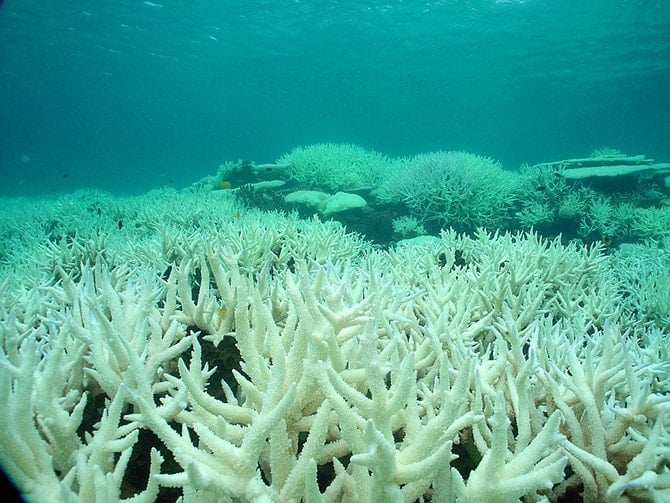May 20, 2025 | 07:31 GMT +7
May 20, 2025 | 07:31 GMT +7
Hotline: 0913.378.918
May 20, 2025 | 07:31 GMT +7
Hotline: 0913.378.918

Marine heatwaves at sea, such as those in Australia, are causing the Great Barrier Reef to bleach and possibly die. Photo: Phys.org.
According to a report from the EU monitor Copernicus, the pace at which oceans are warming has almost doubled since 2005 as global temperatures rise because of human-caused climate change. The findings by the Copernicus Marine Service underscore the consequences of a warming planet on oceans, which cover 70% of earth's surface and acts as a major regulator of the climate.
Ocean warming has "increased continuously" since the 1960s but sharply accelerated in the years since 2005, oceanographer Karina von Schuckmann from Copernicus told reporters. Over the past two decades, the pace of warming has close to doubled from a long-term rate of 0.58 watts/m2 to 1.05 watts/m2.
"Ocean warming can be seen as our sentinel for global warming", said von Schuckmann, a specialist on the unique role the ocean plays in Earth's climate system.
The findings echo the IPCC, the expert panel of climate scientists mandated by the United Nations, on the longer-term heating of the oceans because of humanity's release of planet-heating emissions. Since 1970 some 90% of excess heat trapped in the atmosphere due to the release of carbon dioxide and other greenhouse gasses has been absorbed in the oceans, the IPCC says.
Warmer oceans fuel storms, hurricanes and other extreme weather by influencing global weather patterns and where rainfall lands.
Copernicus said its report detailed "record-breaking ocean temperatures, marine heatwaves stretching down to the deep ocean, unprecedented sea ice loss and rising levels of heat stored in the ocean". It said in 2023, more than 20% of the world's oceans experienced at least one severe to extreme marine heatwave, events that have ripple effects for marine life and fisheries.
Such heatwaves can lead to the migration and mass mortality of certain species, harm fragile ecosystems, and interfere with the flow of deep and shallow waters, hindering the distribution of nutrients. Ocean warming "can affect all aspects of the marine world, from biodiversity to chemistry to fundamental oceanographic processes, currents, and as well as the global climate", said von Schuckmann.
More extensive marine heatwaves also tend to be longer. The average annual maximum duration of such a heat event has doubled since 2008 from 20 to 40 days, according to the latest "Ocean State Report" by Copernicus.
Compared to an earlier baseline, the bottom of the north-east Barents Sea in the Arctic appears to have "entered a state of permanent marine heatwave", said von Schuckmann, citing a research paper. 2023 also saw the lowest sea ice on record in the world's polar regions.
The report said that in August 2022, a temperature of 29.2 degrees Celsius was recorded in the coastal waters of the Balearic Islands off Spain, the warmest in forty years. That same year, a marine heatwave in the Mediterranean Sea stretched to roughly 1.500 meters below the surface, illustrating how heat can reach the deep ocean.
Copernicus noted that ocean acidity had also increased 30% since 1985, another consequence of climate change caused primarily by the burning of fossil fuels. Above a certain threshold, the acidity of seawater becomes corrosive to the minerals used by marine life including corals, mussels, and oysters to make their skeletons and shells.
This threshold - considered a key "planetary limit" by scientists - is expected to be crossed in the near future, according to a report published last week by the Potsdam Institute for Climate Impact Research (PIK).
(AFP)

(VAN) World Environment Day 2025 (June 5) carries the theme 'Beat Plastic Pollution' continuing to emphasize the global urgency of addressing the plastic waste crisis.

(VAN) This was the assessment shared by experts at the workshop titled 'Assessing the Role and Potential of Low-Emission Rice Production Systems in Vietnam,' held on the morning of May 19.

(VAN) Cai Rong Port is the fisheries control center of Quang Ninh, helping to monitor fishing vessels, combat IUU fishing, and remove the EC's 'yellow card'.

(VAN) The German Agricultural Society (DLG) explores the possibility of establishing a mechanization service center in Vietnam’s Mekong Delta to support farmers in accessing and utilizing advanced machinery.

(VAN) On May 16, the Department of Water Resources Management, in collaboration with the Food and Agriculture Organization of the United Nations (FAO), held a signing ceremony for the GEF-8 project document.

(VAN) Food safety, mechanization, vocational training, and market opening are key areas of cooperation expected between the Vietnamese Government and the Federal Republic of Germany.

(VAN) Deputy Minister Nguyen Quoc Tri also expressed his hope that Cuba will soon overcome its current challenges, attain food security, and further expand cooperation with Vietnam.